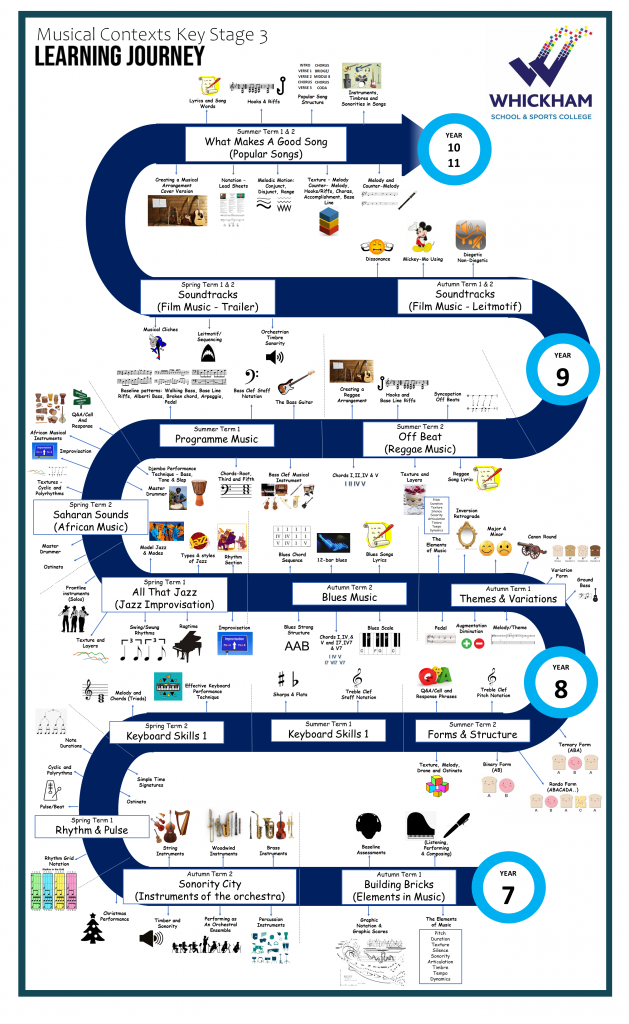Our Music curriculum
Music is the universal language all around us. It engages and motivates, enables personal expression, builds confidence, encourages reflection, boosts emotional development, develops critical engagement, stimulates and inspires us every day.
As pupils progress, they should develop a critical engagement with Music, enabling them to perform, compose and listen with discrimination to a wide range of musical cultures, genres and traditions from a wide variety of composers and styles of music. By learning to perform individually and in an ensemble setting it helps pupils to grow their self-confidence, creativity and sense of achievement, as well as increasing their cooperation, concentration and communication skills.
A high-quality music education should engage and inspire pupils to develop a love of music and their talent as musicians, and so increase their self-confidence, creativity and sense of achievement. As pupils progress, they should develop a critical engagement with music, allowing them to compose, and to listen with discrimination to the best in the musical canon.
The planned music curriculum is essentially threefold in conception: it is topic, theoretically and practically based, fostering both academic rigour and creativity through Active listening, composing and practical music making. Curriculum music lessons not only give a thorough grounding for those wishing to take music further but also provide enjoyable experience and opportunities in many types of music for all pupils, not just those with a specific musical interest.
What we want to achieve:
- The curriculum builds on prior knowledge acquired in Primary school
- Throughout the Curriculum, pupils will learn essential skills, knowledge and understanding structured and sequenced around a ‘learning journey’, to ensure they have a deep understanding of the creative and assessment processes in Music
- A broad and balanced Music Curriculum which is accessible for all pupils and gives everyone the chance to succeed and progress to the next level of musical education regardless of previous musical experience
- Perform, listen to, review and evaluate music across a range of historical periods, genres, styles and traditions, including the works of the great composers and musicians
- Learn to sing and to use their voices, to create and compose music on their own and with others, have the opportunity to learn a musical instrument, use technology appropriately and have the opportunity to progress to the next level of musical excellence
- Understand and explore how music is created, produced and communicated through the use of musical elements
- Opportunities to develop SMSC and to improve Cultural Capital are embraced within schemes of learning
- Pupils will learn about careers and future courses of study where appropriate
- Develop pupils critical analysis skills and imaginative and expressive potential
- Develop pupils emotionally and socially through enjoyment and achievement in the participation of the arts
Music Development Plan:
Learning journey:

Curriculum overview:
| Half Term | Year 7 | Year 8 | Year 9 | Year 10 | Year 11 | Year 12 | Year 13 |
| 1+2 | Elements of Music | Where in the world? | Film music - performance | Analysis of Set works - Area of Study 1 and Free Composition | Analysis of Set works - Area of Study 4 and Set Brief Composition | Practical Music Theory and Harmony | Solo Performance |
| 3+4 | PAAE / Fanfare | Gamelan music / Folk music | Film music - PA&C | Analysis of Set works - Area of Study 2 and Free Composition | Completion of Performance and Composition coursework | Professional Practice in the Music Industry | Solo and Ensemble Performance |
| 5+6 | Keyboard Skills - Notation & performance | Variation & texture | What makes a good song? | Analysis of Set works - Area of Study 3 and Free Composition | Revision of Set Works and Exam | A good musician… in theory! | Solo and Ensemble Performance |
Pupils will commence on a new and exciting curriculum journey from September 2023 which is deigned to ensure the key skills of performing, composing and appraising are well developed and embedded throughout Key Stage 3 and Key stage 4:

